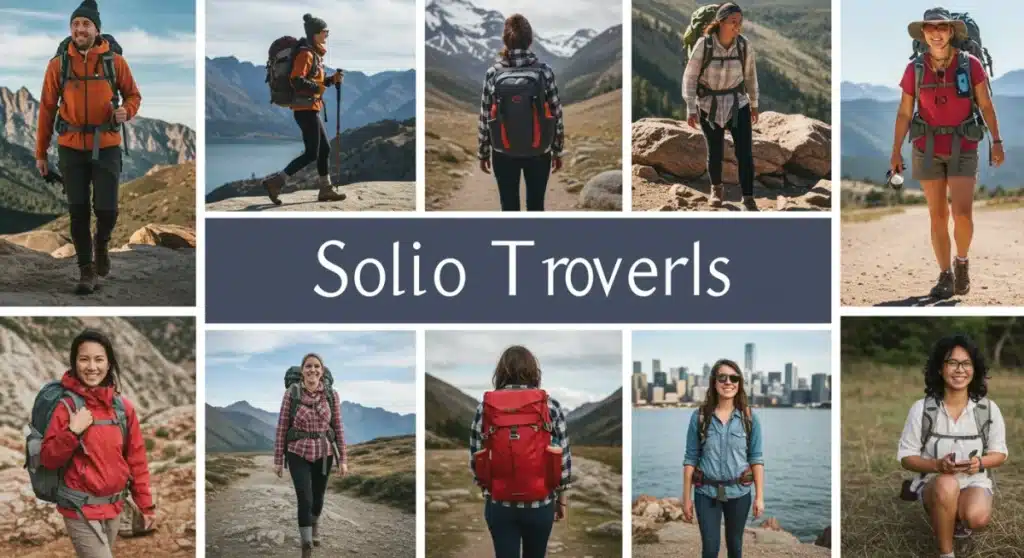2025 Solo Travel Market U.S.: Demographics & Motivations

As the travel industry anticipates 2025, a critical shift is underway in how Americans choose to explore. The phenomenon of solo travel is no longer a niche but a significant force, making Understanding the 2025 Market for Solo Travel in the U.S.: Demographics and Motivations more vital than ever for industry stakeholders.
The Accelerating Rise of Solo Travel in the U.S.
Recent projections indicate a substantial increase in solo travel within the United States for 2025. This surge is attributed to a confluence of factors, including changing societal norms, technological advancements that facilitate independent journeys, and a renewed emphasis on personal well-being. Data from leading travel analytics firms suggests that solo bookings are on track to surpass pre-pandemic levels, signaling a robust and sustained growth trajectory for this segment.
Travel providers and destinations are actively recalibrating their strategies to cater to this expanding demographic. The shift is not merely quantitative; it represents a qualitative change in traveler expectations and desires. Understanding these nuances is paramount for capturing a share of this lucrative market.
Key Demographic Shifts Driving Solo Adventures
The solo traveler of 2025 is more diverse than ever, challenging previous stereotypes. While younger generations continue to embrace solo exploration, there’s a notable uptick in older adults and women embarking on independent trips. This broader demographic appeal underscores a fundamental change in how individuals perceive and approach travel.
Generational Insights and Preferences
- Gen Z and Millennials: These groups prioritize authentic experiences, sustainability, and digital connectivity, often using solo travel for personal growth and social media content.
- Gen X: Many Gen X solo travelers seek respite from daily responsibilities, focusing on relaxation, cultural immersion, and often combining business with leisure.
- Baby Boomers: This demographic increasingly views solo travel as an opportunity for self-discovery post-retirement, valuing comfort, safety, and well-organized itineraries.
Each generation brings unique demands and expectations to the solo travel experience, requiring tailored offerings from the industry.
Evolving Motivations for Traveling Alone
The reasons behind choosing solo travel are becoming increasingly complex and varied. Beyond the traditional pursuit of independence, travelers are now driven by a deeper quest for self-discovery, mental well-being, and specialized interests. The pandemic, in particular, has reshaped perspectives on travel, emphasizing personal freedom and the pursuit of individual passions.
Top Motivations for Solo Travelers
- Self-Discovery and Personal Growth: A significant portion of solo travelers seek opportunities for introspection, challenging themselves, and learning new skills in unfamiliar environments.
- Flexibility and Freedom: The ability to set one’s own itinerary, pace, and make spontaneous decisions without compromise remains a primary draw.
- Pursuit of Niche Interests: Solo journeys often facilitate participation in specific hobbies, such as photography workshops, culinary tours, or adventure sports, which might be difficult to coordinate with companions.
- Mental Well-being and Digital Detox: Many travelers are opting for solo trips to disconnect from daily stressors, recharge, and focus on their mental health, often seeking destinations that promote tranquility and mindfulness.
These motivations highlight a shift towards more purposeful and intentional travel experiences. Travel providers must understand these underlying drives to craft compelling solo travel products.
The Impact of Technology and Safety Concerns
Technology plays a pivotal role in empowering solo travelers, addressing both logistical challenges and safety concerns. Mobile applications for navigation, communication, and emergency services have become indispensable tools. Furthermore, the proliferation of online communities and forums dedicated to solo travel provides valuable resources, support, and a sense of camaraderie among independent explorers.

Safety, however, remains a paramount concern, particularly for female solo travelers and older adults. Destinations and accommodations that prioritize and clearly communicate their safety measures are gaining a competitive edge. This includes secure lodging options, well-lit public spaces, and readily available emergency contact information.
Enhancing the Solo Travel Experience Through Innovation
- AI-Powered Itinerary Planning: Tools that suggest personalized routes and activities based on individual preferences and real-time conditions.
- Smart Safety Devices: Wearable tech with GPS tracking and one-touch emergency alerts.
- Community Building Platforms: Apps connecting solo travelers in real-time for shared activities or meetups, without compromising independence.
The integration of technology to enhance safety and convenience is a key differentiator in the 2025 solo travel market.
Emerging Trends and Niche Markets
Beyond broad demographic shifts, several emerging trends are shaping the solo travel landscape. These include a growing interest in sustainable travel, wellness retreats, and experiential learning journeys. Niche markets, such as solo adventure travel or gastronomical tours designed for one, are also gaining traction, indicating a desire for highly specialized and personalized experiences.
Destinations that can offer unique, immersive, and responsible travel options are proving particularly attractive. The demand for authentic local interactions and opportunities to contribute positively to host communities is also on the rise. This points towards a more conscious and values-driven solo traveler.
Opportunities in Specialized Solo Travel
- Eco-Tourism and Sustainable Travel: Solo travelers seeking to minimize their environmental footprint and engage with conservation efforts.
- Wellness and Retreats: Independent trips focused on meditation, yoga, spa treatments, or digital detox experiences.
- Skill-Based Travel: Journeys centered around learning a new skill, such as cooking, photography, or a foreign language.
These niche areas represent significant growth potential for providers willing to innovate and cater to specific interests.
Preparing for the Future: Recommendations for the Industry
To effectively engage with the 2025 solo travel market, industry players must adopt a proactive and adaptive approach. This involves not only understanding the current trends but also anticipating future shifts in traveler behavior and preferences. Investment in personalized marketing, flexible booking options, and enhanced safety protocols will be crucial. Furthermore, fostering a sense of community among solo travelers, even during independent journeys, can build loyalty and encourage repeat business.
Collaboration between destinations, tour operators, and technology providers will also be essential in creating a seamless and enriching experience for the solo explorer. The market is ripe for innovation, and those who can best meet the evolving needs of this dynamic segment will thrive.
| Key Aspect | Brief Description |
|---|---|
| Demographic Diversity | Solo travel appeals to all ages, from Gen Z to Baby Boomers, each with distinct needs. |
| Evolving Motivations | Beyond independence, travelers seek self-discovery, wellness, and niche interest fulfillment. |
| Technology & Safety | Apps and safety measures are crucial enablers, addressing key concerns for independent explorers. |
| Emerging Niche Markets | Growth in sustainable travel, wellness retreats, and skill-based solo journeys. |
Frequently Asked Questions About Solo Travel in 2025
The typical solo traveler in 2025 is increasingly diverse, spanning all adult age groups from Gen Z to Baby Boomers. While younger generations seek personal growth, older travelers often focus on self-discovery post-retirement. Women, in particular, represent a growing segment of independent adventurers.
Motivations extend beyond just independence. Solo travelers are driven by desires for self-discovery, personal growth, mental well-being, and the pursuit of niche interests like culinary tours or adventure sports. Flexibility in itinerary planning is also a significant factor.
Technology significantly enhances solo travel safety through navigation apps, communication tools, and emergency services. Online communities also provide support. Destinations and providers prioritizing secure lodging and clear safety protocols are highly valued by solo travelers.
Key emerging trends include a strong interest in sustainable travel, wellness retreats, and experiential learning journeys. Niche markets like solo adventure travel and gastronomical tours are also gaining traction, reflecting a desire for highly personalized experiences.
The industry should focus on personalized marketing, flexible booking options, and enhanced safety protocols. Fostering a sense of community, even for independent travelers, and offering unique, immersive, and responsible travel options are also crucial for attracting this growing market segment.
Looking Ahead
The continued evolution of the solo travel market in the U.S. signals a profound shift in consumer behavior, moving towards more intentional and personalized experiences. Industry players must remain agile, leveraging data and technological advancements to cater to a diverse clientele seeking everything from profound self-discovery to specialized adventures. The coming months will undoubtedly bring further innovations and adaptations as the travel sector responds to the dynamic needs of the independent explorer, solidifying solo travel as a cornerstone of the American tourism landscape.